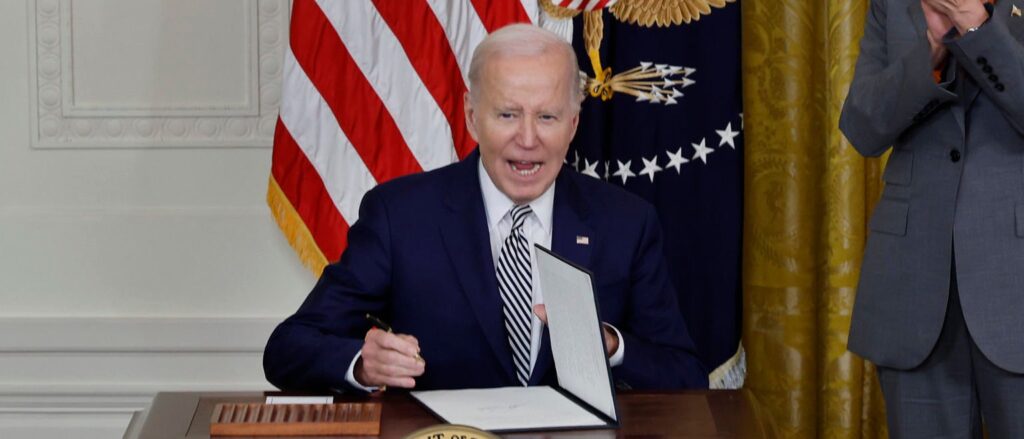The Biden administration has increasingly relied on a law intended to shore up national defense in order to enact its economic agenda, boosting green energy initiatives and increasing production of certain goods to address economic issues.
President Joe Biden once again used the Defense Production Act (DPA), a law established in 1950 to give the president authority over domestic industries necessary for the national defense thanks to demands caused by the Korean War, in late November, this time to invest $35 million in domestic manufacturing on medicine components to address shortages, according to a statement from the White House. The use of the DPA is one of many following President Donald Trump’s expansion of the act during the COVID-19 pandemic in order to increase the production of equipment related to national health. (RELATED: As ‘Bidenomics’ Falls Flat, Dems Go On Attack With ‘MAGAnomics’ Moniker)
Economists have raised concerns over the frequent use of the DPA, pointing to the expansion of executive power and government involvement in areas that are not directly related to national security.
“The use of the DPA for baby formula, green energy, and medicinal purposes pushes its limits to an extreme — but one that was predictable,” Peter Earle, economist at the American Institute for Economic Research, told the DCNF. “Electrical vehicles have nothing whatsoever to do with any reasonable definition of national defense.”
In June 2022, Biden evoked the DPA to give the Department of Energy (DOE) the authority to invest in facilities, manufacturing, processing components and installation for green energy technology, according to the DOE. The order incentivized the production of solar energy equipment, transformers, grid components, heat pumps, insulation, electrolyzers, fuel cells and platinum-group metals to achieve carbon emission goals while also seeking to reduce the need for foreign energy sources, particularly from adversarial countries.
“Biden has repeatedly abused the DPA to enrich the donor class behind many left-wing causes, especially so-called green energy,” E.J. Antoni, a research fellow at the Heritage Foundation’s Grover M. Hermann Center for the Federal Budget, told the DCNF. “In misusing the DPA, Biden has unconstitutionally diverted billions of taxpayer dollars to building inefficient solar panels and unwanted electric vehicles, the latter of which are now piling up on dealers’ lots, unable to be sold.”
In 2021, China produced 79% of the global supply of polysilicon, a key component of solar panels, with 42% of that production coming from the Xinjiang region of China, which is known for its use of Uighur slave labor by the Chinese. China dominates the supply chain of green technology, being responsible for 90% of rare earth metals and producing 79% of all lithium-ion batteries sold in 2021.
Biden also issued a presidential determination in March 2022 giving the Department of Defense (DOD) authority to intervene in private industries to support mining and processing of strategic and critical materials used in batteries for the electric vehicle industry (EV) in order to support a “clean energy economy” and “clean energy supply chains,” according to the DOD. The stated goal of the move was to decrease the United States’ dependence on unreliable foreign mineral sources necessary for a green energy transition.
To keep this pause in fighting going beyond tomorrow is our goal – so that we can continue to see more hostages come out and surge more humanitarian relief to those in need. pic.twitter.com/R9RO8OnTmu
— President Biden (@POTUS) November 26, 2023
The EV industry is being bolstered by government help through subsidies in the IRA and through beneficial DPA intervention, even as consumer demand has been cooler than anticipated. Automakers have repeatedly reported profit losses related to their EV production, including Ford, which previously estimated it would run an operating loss of $4.5 billion in 2023 for its electric Model e.
Biden also invoked the DPA when dealing with a domestic shortage of baby formula, requiring manufacturers to use resources in the production of baby formula rather than other products to increase supply, according to a press release from the White House. The U.S. experienced a baby formula shortage in 2021 following a major production plant being shut down due to safety and sanitary concerns.
“The baby food shortage was easily remediable by eliminating lobbied-for tariffs and expanding the number of firms licensed by the US Department of Agriculture to produce formula for the Women, Infants, and Children program,” Earle told the DCNF. “And as for green energy, to the extent that the Act permits government loans and guarantees without Congressional oversight, it could easily become a backdoor to a de facto national industrial policy.”
The Biden administration in October invoked the DPA to require that tech companies share critical information and safety test results for their artificial intelligence (AI) systems, according to a White House fact sheet. The move aims to stop AI models that could pose a risk to national security, economic security or public health.
“At this point, it’s naive to think that the use cases of the Act won’t expand further, whether within or outside the context of a national emergency,” Earle told the DCNF. “The incrementalism of the past 5 years makes the possibility of increasingly creative applications of the Defense Production Act likely.”
The White House did not respond to the DCNF’s request for comment.
All content created by the Daily Caller News Foundation, an independent and nonpartisan newswire service, is available without charge to any legitimate news publisher that can provide a large audience. All republished articles must include our logo, our reporter’s byline and their DCNF affiliation. For any questions about our guidelines or partnering with us, please contact licensing@dailycallernewsfoundation.org.


